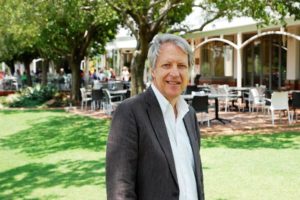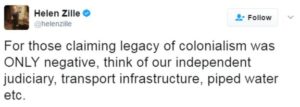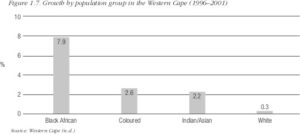
The election of an ethnic Xhosa to lead South Africa’s opposition DA in the Western Cape, represents a new low regarding white and Western influence within the country, argues Dan Roodt.
Published: October 7, 2017, 7:53 pm
Nowhere is the inexorable anti-white logic of multicultural societies more evident than in South Africa, where the biggest oppostion party, the Democratic Alliance, has just elected a black leader in the Western Cape, the only province not ruled by the African National Congress (ANC). Bonginkosi Madikizela, the newly elected leader concerned, shares a surname with Winnie Mandela who, after her divorce from Nelson, adopted her maiden name Winnie Madikizela, sometimes in double-barrel form as “Winnie Madikizela-Mandela”.
Like the ethnic Xhosas Nelson and Winnie, Bonginkosi Madikizela hails from the former Transkei homeland, which makes him a Xhosa too. Until recently, both mixed-race Coloureds and whites outnumbered Xhosas in the Western Cape, but constant migration from the former Transkei, now part of the Eastern Cape province, has placed Xhosas in the ascendance, now constituting about a third of the population there, and replacing whites as the second-most numerous group. In 1994 when South Africa’s political revolution took place, there were fewer than 4 million people in the Western Cap, with coloureds in the majority but more whites than black Africans. However, by 2013 it was reported by the Independent Newspaper Group that “the percentage of coloured people in the Western Cape dropped from 53.9 percent in 2001 to 49.6 percent in 2011 and the white population from 18.4 percent to 16 percent while the black population increased from 26.7 percent to 33.4 percent. The Indian population grew from 1 percent to 1.1 percent over the same period.”
Politically, the Western Cape has been a stronghold of opposition politics and the only province not governed by ANC, which dominates the rest of the country. Helen Zille, a white woman of liberal persuasion and former leader of the party in the province, is still provincial premier but has recently seen her star fading when she was embroiled in an acrimonious racial spat due to a tweet sent from Singapore in which she said that the legacy of colonialism was not “only negative”.

Twenty percent of the Western Cape’s population was born outside of the province, with 16 percent coming from other parts of South Africa, mainly the Eastern Cape or ex-Transkei, and four percent from other countries.

A graph showing the stagnant white population of the Western Cape, with blacks growing rapidly from 1996 to 2001.
The election of Madikizela therefore marks a turning point in the Western Cape’s demographic and political “exceptionalism” in South Africa, signifying the incipient domination of Xhosas and African blacks after years of in-migration. Ironically, or perhaps not, Madikizela is a former ANC member who became disgruntled with the ruling party, then joined the mainly rural and ethnic Xhosa United Democratic Movement (UDM), and afterwards the DA under Zille.
Due to her “colonialism tweet”, Zille was stripped of all functions in the party that she had once led and barely allowed to stay on as an ordinary member. In an article published in the country’s biggest newspaper, The Sunday Times, she referred to the “white-bashing cancer (that) destroys South Africa from within”. Once her term as provincial premier of the Western Cape ends, there will be no whites left in positions of political power in South Africa.
The jubilation of Madikizela’s supporters today on hearing the news that he has become the DA leader of the Western Cape, South Africa’s second-richest province and the original centre of Western settlement in the country in the seventeenth century, also expressed their optimism at the coming Xhosa conquest of the party in the province.
While the country’s largest black ethnic group, the Zulus, already dominates the central government based in Pretoria, once the capital of a Boer republic, their Xhosa allies within the ANC will receive second prize, the equally Westernised province of the Western Cape.
Demography is destiny, as Auguste Comte said. Nowhere is this better illustrated than in South Africa’s intensely ethnic politics, masquerading as “harmonious multiculturalism”. To the two biggest tribes go the spoils of the two richest and most-developed provinces, Gauteng and the Western Cape, where most whites and most taxpayers live.
While “colonialism” and Western influence generally remain anathema in an Africanising South Africa, as Zille found out to her chagrin, black politicians and their millions of migrating voters will not say no to enjoying the fruits of Westernism — even while they proceed to exclude whites from politics altogether.
All rights reserved. You have permission to quote freely from the articles provided that the source (www.freewestmedia.com) is given. Photos may not be used without our consent.

DAN ROODT
dan.roodt@freewestmedia.com
Exclusively for freewestmedia.com
Dan Roodt: In South Africa, whites no longer lead anything – even in opposition politics

